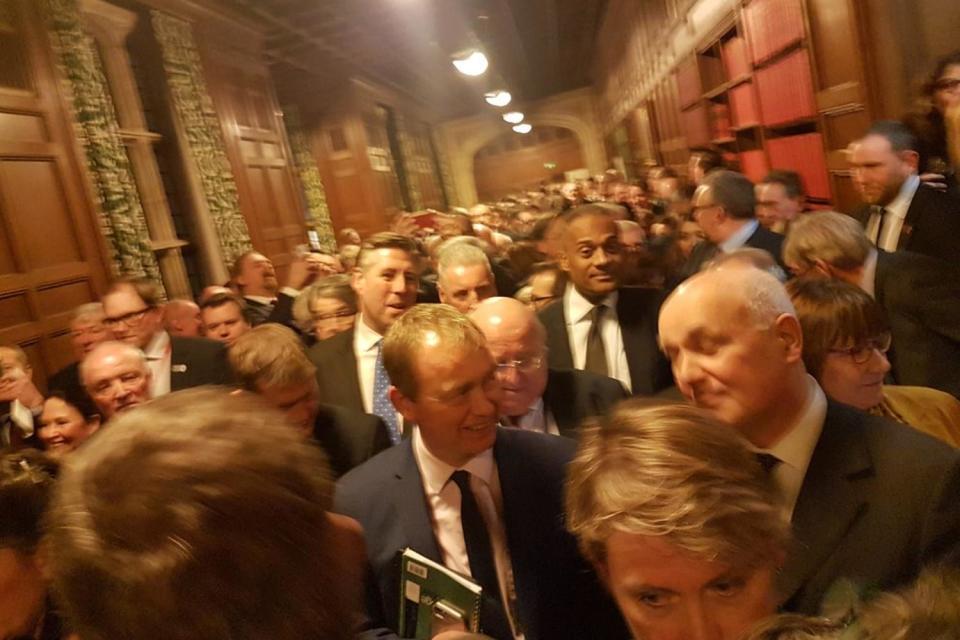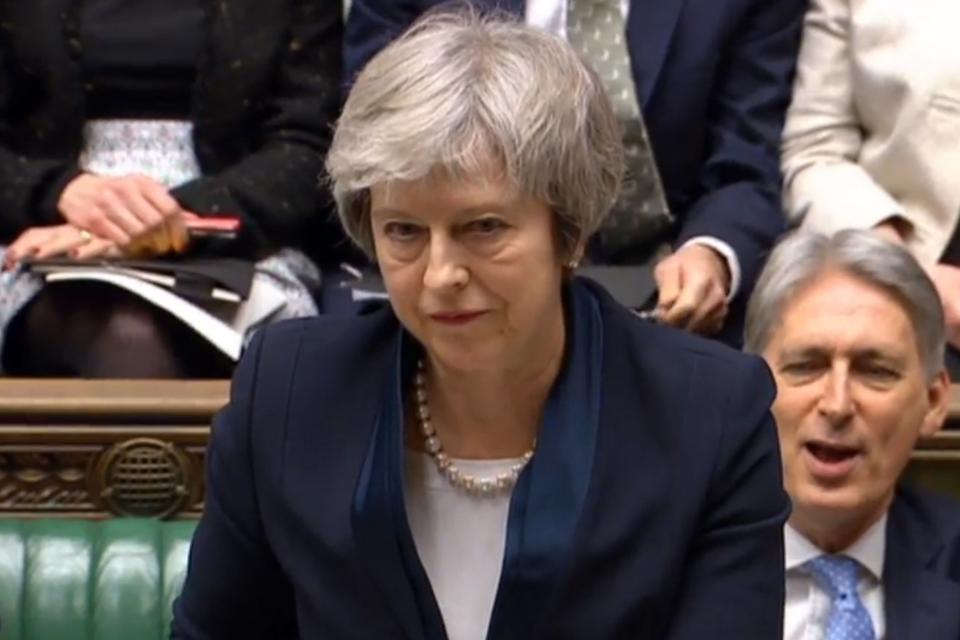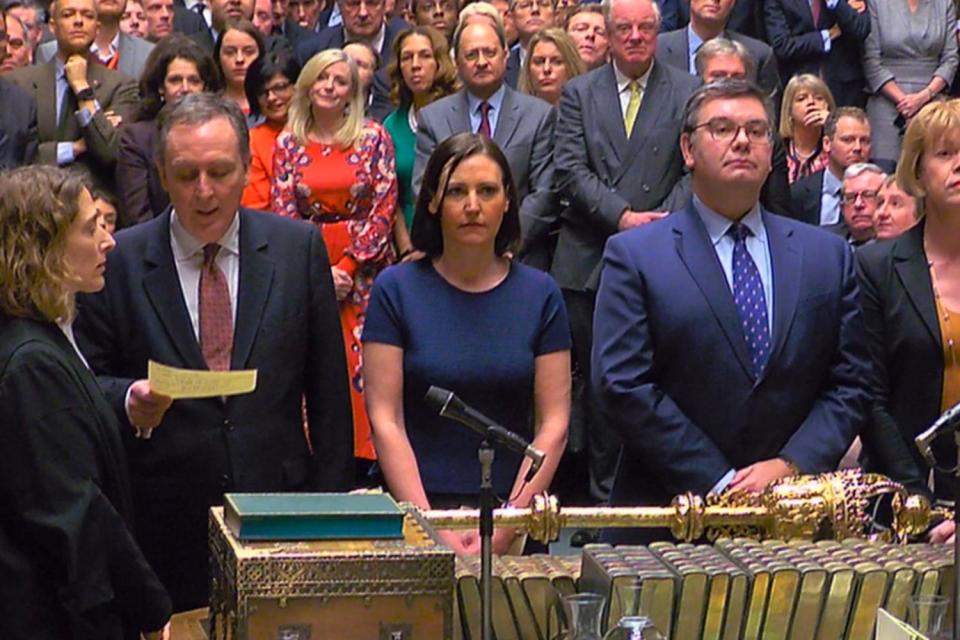Brexit result: Theresa May faces confidence vote after her Brexit deal suffers historic Commons defeat
Theresa May is to face a confidence vote in the Government after her Brexit deal went down to a crushing defeat in the Commons by 432 votes to 202.
The Prime Minister responded to the rout by telling the Commons: “The House has spoken and the Government will listen.”
In a major shift of policy, she promised to let the Commons debate other ideas, such as softer Brexit plans.
Mrs May indicated she would not resign, but bookmakers halved the odds on her early departure.

“It is my duty to deliver on their instruction and I intend to do so,” she said at the dispatch box in the Commons.

Jeremy Corbyn called it “the greatest defeat for a government since the 1920s” and declared he would table a motion of no confidence. This will be debated and voted on tomorrow.
A major defeat for Mrs May’s withdrawal bill was expected by all – but the huge shortfall of 230 votes was worse than many experts and MPs had expected.

MPs said the No lobby of the Commons had never been so crowded in their lifetimes.
Despite what Mr Corbyn said, it was in fact worse than the last record defeat, when Ramsay Macdonald was crushed by 166 in 1924.
In total 118 Conservative MPs rebelled against Mrs May.
Mrs May indicated that the Commons will be allowed to debate “in a constructive spirit” different plans. “It is clear that the House does not support this deal but tonight’s vote tells us nothing about what it does support,” she said.
While her words indicated that support for Plan Bs will be tested, she did not set out details and did stopped short of offering indicative votes. She said the plans must be “genuinely negotiable” at the EU and enjoy sufficient support in the Commons.
Historic losses in the Commons
October 8, 1924: Ramsay MacDonald’s minority Labour government went down to a defeat of 166 on an amendment to set up a select committee to investigate a decision to drop legal proceedings against the editor of a Communist newspaper that had encouraged soldiers to mutiny.
March 22, 1979: A Labour government led by Jim Callaghan lost by 89 votes on a motion to annul fees for a firearms licence.
April 14, 1986: the Conservative government of Margaret Thatcher suffered a rare defeat over plans to relax laws on Sunday trading. MPs voted against the Shops Bill by 296 to 282 — a government defeat of 14.
July 10, 1996: John Major’s government suffered a defeat of 149 in a showdown over MPs’ pay.
November 9, 2005: Tony Blair’s Labour government was defeated on its proposal to allow police to detain terror suspects for up to 90 days without charge. MPs voted against by 322 votes to 291 — a government defeat of 31.
July 10, 2012: David Cameron’s coalition government was forced to abandon plans to reform the House of Lords after 91 Tory MPs defied a three-line whip to vot against a Bill that would have seen 80 per cent of peers elected and the total number of members halved to 450.
Mrs May said the defeat revealed nothing about how “how or even if [the Commons] intends to honours the decision that the British people took” in the 2016 referendum.
She said there was now a need for “clarity on these questions as soon as possible”.
Pre-empting Mr Corbyn, she went on: “We need to confirm whether this Government still enjoys the confidence of this House. If the official opposition table a confidence vote this evening … the Government will make time tomorrow.”
Theresa May's full speech after historic Brexit defeat
Mr Speaker, the House has spoken and the Government will listen.
It is clear that the House does not support this deal. But tonight’s vote tells us nothing about what it does support. Nothing about how - or even if - it intends to honour the decision the British people took in a referendum Parliament decided to hold.
People, particularly EU citizens who have made their home here and UK citizens living in the EU, deserve clarity on these questions as soon as possible. Those whose jobs rely on our trade with the EU need that clarity. So with your permission Mr Speaker I would like to set out briefly how the Government intends to proceed.
First, we need to confirm whether this Government still enjoys the confidence of the House. I believe that it does, but given the scale and importance of tonight’s vote it is right that others have the chance to test that question if they wish to do so. I can therefore confirm that if the Official Opposition table a confidence motion this evening in the form required by the Fixed Term Parliaments Act, the Government will make time to debate that motion tomorrow. And if, as happened before Christmas, the Official Opposition decline to do so, we will – on this occasion - consider making time tomorrow to debate any motion in the form required from the other opposition parties, should they put one forward.
Second, if the House confirms its confidence in this Government I will then hold meetings with my colleagues, our Confidence & Supply partner the DUP and senior Parliamentarians from across the House to identify what would be required to secure the backing of the House. The Government will approach these meetings in a constructive spirit, but given the urgent need to make progress, we must focus on ideas that are genuinely negotiable and have sufficient support in this House.
Third, if these meetings yield such ideas, the Government will then explore them with the European Union.
Mr Speaker I want to end by offering two reassurances.
The first is to those who fear that the Government’s strategy is to run down the clock to 29th March. That is not our strategy. I have always believed that the best way forward is to leave in an orderly way with a good deal and have devoted much of the last two years negotiating such a deal. As you confirmed Mr Speaker, the amendment to the business motion tabled last week by my Right Honourable and Learned Friend the Member for Beaconsfield is not legally binding, but the Government respects the will of the House. We will therefore make a statement about the way forward and table an amendable motion by Monday.
The second reassurance is to the British people, who voted to leave the European Union in the referendum two and a half years ago. I became Prime Minister immediately after that referendum. I believe it is my duty to deliver on their instruction and I intend to do so.
Mr Speaker every day that passes without this issue being resolved means more uncertainty, more bitterness and more rancour. The Government has heard what the House has said tonight, but I ask Members on all sides of the House to listen to the British people, who want this issue settled, and to work with the Government to do just that.
Labour MP Yvette Cooper called for a delay to Brexit., which is due on March 29. She said the PM must “listen to voices from across this House”.
Labour MP Tulip Siddiq, who is heavily pregnant, was wheeled through the voting lobby in a wheelchair. Mrs May stopped to chat with the Labour MP who, as the Standard revealed, delayed giving birth by Caesarean section in order to vote.
The result drew a chilly warning from the European Union that “time is almost up”.
European Commission president Jean-Claude Juncker gave no promise of concessions, but said the EU would redouble contingency planning for a no-deal Brexit in 73 days.
The bureaucrat, who had pulled out of an event in Strasbourg on Wednesday because of the vote, said in a statement: "I take note with regret of the outcome of the vote in the House of Commons this evening.”
Mr Juncker went on: "The risk of a disorderly withdrawal of the United Kingdom has increased with this evening's vote. While we do not want this to happen, the European Commission will continue its contingency work to help ensure the EU is fully prepared.
"I urge the United Kingdom to clarify its intentions as soon as possible. Time is almost up."
Mrs May is expected to go back to Brussels to plead for further concessions. Earlier, the Cabinet had been divided on whethr she should seek a deal with Labour or offer the Commons a series of votes on other options.
Most MPs believe Mrs May can cling on to her job and that Tories will unite to survive the motion of no-confidence.

 Yahoo News
Yahoo News 